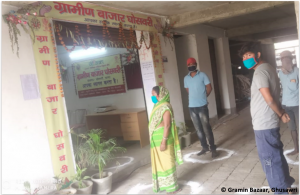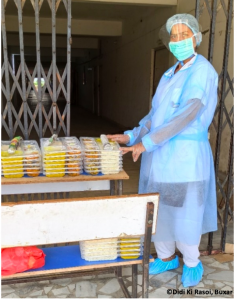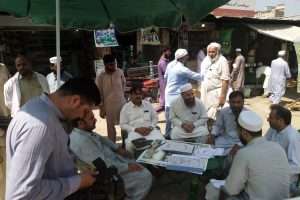In the shadow of COVID-19, women owned enterprises have found their space under the sun and have provided a lesson or two in embedding empathy into the very fabric of enterprise, opines Siddharth Chaturvedi.
CONTEXT
Bhayya, aap yahin gadda dalwa dijiye, hum canteen mein so jayenge, lekin mareezon ko jab khana chahiye tab denge (Get us a bed here in the canteen itself, we will sleep here but serve patients when they need it), remarked Sanju Devi and Priyanka Devi from Didi Ki Rasoi, Buxar in Bihar as they left for home after serving quarantined patients through the day. Around 45 million women who are now part of the 4 million Self Help Groups (SHGs) under National Rural Livelihoods Mission (NRLM) are moving towards the next wave of livelihoods in the form of entrepreneurship. These women are no longer satisfied with the age old achaar-paapad units earning daily wages. They are looking to take centerstage with their entrepreneurial journey.
 Members follow Social Distancing in Ghusawri, Patna
Members follow Social Distancing in Ghusawri, Patna
As we stare at COVID times, here are two stories from the hinterlands of Bihar on how nano and micro women owned enterprises are providing Raashan, Khana, Paani (grocery, food and water) to the rural populace and giving reassurance that they are true blue entrepreneurs who would survive the bad times as well.
Raashan through Gramin Bazaar
A dipstick enterprise survey conducted in 2017 by JEEViKA[1] revealed that 34% of nano and micro[2] enterprises were doing retail business with almost 10% of them being kirana stores. Building community institutions had always been JEEViKA’s strength; hence the same collectivization approach was taken to set up Gramin Bazaar, a wholesale store owned and managed by an association of kirana store owners, that supplies only to members of the association. The kirana store owners are all SHG members – each of them pays a share capital of Rs. 2000 while the project provides one-time startup capital and training support. The association conducts a market survey to identify vendors, does procurement of items and decides sale prices in weekly meetings. A small margin is retained by the Gramin Bazaar to ensure economic sustainability. The association also places a store manager who handles the digital inventory management system.
Table 1: Gramin Bazaar in numbers
 Source: Anecdotal information from JEEViKA
Source: Anecdotal information from JEEViKA
While there is fear of unavailability of essential items as the lockdown has been extended multiple times, the impact on rural kirana stores in the catchment of Gramin Bazaars has been unexpected. First, the demand from the rural households has not seen much change as many small towns remain unaffected. Second, raashan items such as rice, aata, daal have been made available at pre-COVID prices to association members with the buffer stock maintained at Gramin Bazaar, beating market volatility. The associations have also extended sales to non-members and community institutions such as Village Originations (VOs) while following social distancing norms all along the supply chain.
Of course, they have also faced their fair share of problems, the foremost being movement due to lockdown. “Thana area mein bahut sawaal jawaab hota hai, kahan jaana hai, kyun jaana hai (A lot of questions are asked near the local police post, where are you going, why are you going” said Gitanjali Devi, a kirana entrepreneur from Asthawa. Passes were issued to some association members and doorstep deliveries were enabled for members who could not come to the store. Nevertheless, the entrepreneurial spirit has prevailed as push on sale of hand sanitizers has picked up and nano entrepreneurs are feeling confident of the “vishwaas, ki gramin bazaar hai (we have faith that Gramin Bazaar is there)” or as the marketing gurus would say, customer loyalty.
Khaana Paani through Didi Ki Rasoi
Didi Ki Rasoi (Kitchen) are women owned and operated social enterprises providing quality food in civil hospitals of Bihar. The idea took root when JEEViKA partnered with the State Health Society, Bihar, to manage food services for in-house patients through JEEViKA didis while also running it as a restaurant for walk-in guests. Since, the quality of food and hygiene set it apart from existing vendors, Kudumbashree[3] was brought on board as a technical partner for training of entrepreneurs and instituting food quality management systems. A rigorous selection process of entrepreneurs that included a relatively higher quantum of equity investment was matched by a one-time support grant from the project.

Ready to serve patients
These enterprises are today an essential arm of the team of health workers. As patients add to quarantine centres, the normal schedule of cooking food for a pre-decided number of patients does not hold. The didis have managed to successfully handle this, keeping in view rising health risk with addition of patients in quarantine. This risk has only strengthened their resolve with all rasois operating overtime, but they are also efficiently managing their working hours and finding their own solutions. While Didi Ki Rasoi, Vaishali, has restricted delivery through packed thalis, the Buxar unit has hired an additional service executive for delivery in multiple quarantine centres.
A testimonial to the food quality is in the fact that the same food packets are being supplied to patients as well as health workers (nurses, doctors and attendants) and not a single complaint has come in. On the contrary, the doctors requested administration to get Didi Ki Rasoi back as the food supplier when a different vendor was engaged due to a surge in number of quarantine centers, from three to six in the district of Buxar.
Table 2: Didi Ki Rasoi in numbers

Source: Anecdotal information from JEEViKA
TAKEAWAY
The emerging lessons from these initiatives are:
- The concept of equity investment or micro equity is still not prevalent for micro enterprises; providing a start-up grant has helped take away the fear of failure as there is no burden of debt and there is room for experimentation.
- Decentralized approach to enterprise development allows each unit to build nuanced solutions as contexts emerge and helps build enterprises and entrepreneurs.
- Initial handholding in the form of technical and business training to stoke the entrepreneurial mindset are key elements in making the decentralized approach work.
In the shadow of COVID-19, it is these women owned enterprises that have found their space under the sun and have provided a lesson or two in embedding empathy into the very fabric of enterprise.
References
[1] Bihar Rural Livelihoods Promotion Society (BRLPS), an autonomous body under the Department of Rural Development, is spearheading the World Bank aided Bihar Rural Livelihoods Project (BRLP), locally known as JEEViKA with the objective of social & economic empowerment of the rural poor.
[2] Nano enterprises are mostly self-sustenance enterprises with an annual turnover of approximately Rs. 4-6lakhs
Micro enterprises in this context are enterprises with a slightly higher turnover than nano enterprises with an annual turnover of Rs. 6-15 lakhs and employ one or two people apart from the owner.
[3] Kudumbashree is the State Rural Livelihoods Mission of Kerala that has developed support groups engaged in providing technical and marketing support for promotion of women owned foodservice enterprises and have supported over 1500+ such enterprises in Kerala
Note: Gramin Bazaar and Didi Ki Rasoi are initiatives under the World Bank funded Bihar Transformative Development Project implemented by JEEViKA (BRLPS). In his role as a Consultant with the World Bank, the author has provided technical support to JEEViKA team for its roll out.
 Siddharth Chaturvedi works in the field of rural livelihoods, social innovations and non-farm micro enterprise development in India. He has worked with National Rural Livelihoods Mission and Tata Cornell Institute. He is also a Consultant with The World Bank and UNDP. He is an Agricultural Engineer from Pantnagar University and MBA from Asian Institute of Management, The Philippines.
Siddharth Chaturvedi works in the field of rural livelihoods, social innovations and non-farm micro enterprise development in India. He has worked with National Rural Livelihoods Mission and Tata Cornell Institute. He is also a Consultant with The World Bank and UNDP. He is an Agricultural Engineer from Pantnagar University and MBA from Asian Institute of Management, The Philippines.





Add Comment